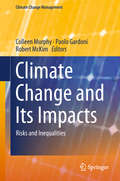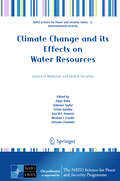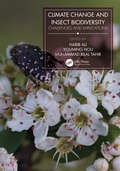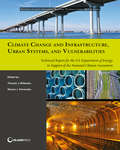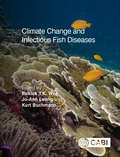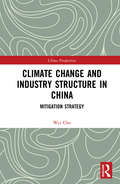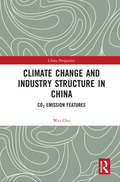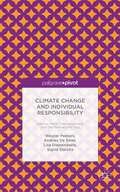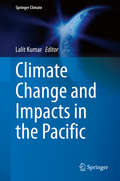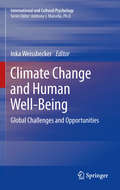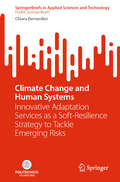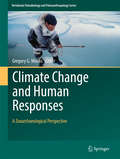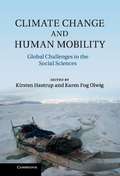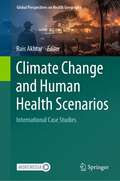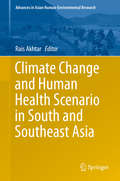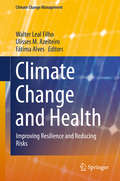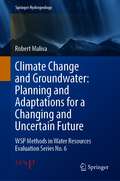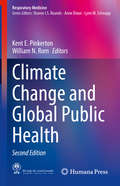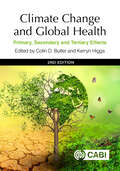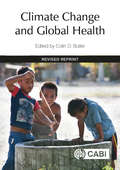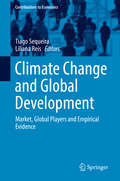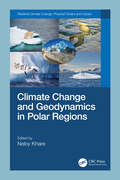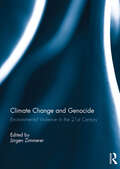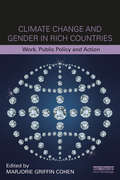- Table View
- List View
Climate Change and Justice
by Jeremy MossAchieving climate justice is increasingly recognized as one of the key problems associated with climate change, helping us to determine how good or bad the effects of climate change are, and whether any harms are fairly distributed. The numerous and complex issues which climate change involves underline the need for a normative framework that allows us both to assess the dangers that we face and to create a just distribution of the costs of action. This collection of original essays by leading scholars sheds new light on the key problems of climate justice, offering innovative treatments of a range of issues including international environmental institutions, geoengineering, carbon budgets, and the impact on future generations. It will be a valuable resource for researchers and upper-level students of ethics, environmental studies, and political philosophy.
Climate Change and Its Impacts: Risks and Inequalities (Climate Change Management)
by Colleen Murphy Paolo Gardoni Robert McKimResponding to a need for a deeper and more nuanced understanding of the consequences of climate change, this book brings experts in climate science, engineering, urban planning, and conservation biology into conversation with scholars in law, geography, anthropology and ethics. It provides insights into how climate change is conceptualized in different fields. The book also aims to contribute to developing successful and multifaceted strategies that promote global, intergenerational and environmental justice. Among the topics addressed are the effects of climate change on the likelihood and magnitude of natural hazards, an assessment of civil infrastructure vulnerabilities, resilience assessment for coastal communities, an ethical framework to evaluate behavior that contributes to climate change, as well as policies and cultural shifts that might help humanity to respond adequately to climate change.
Climate Change and its Effects on Water Resources: Issues of National and Global Security (NATO Science for Peace and Security Series C: Environmental Security)
by Alper Baba Antonio Chambel Gökmen Tayfur Ken W.F. Howard Michael J. Friedel Orhan GündüzNational and global security can be assessed in many ways but one underlying factor for all humanity is access to reliable sources of water for drinking, sanitation, food production and manufacturing industry. In many parts of the world, population growth and an escalating demand for water already threaten the sustainable management of available water supplies. Global warming, climate change and rising sea level are expected to intensify the resource sustainability issue in many water-stressed regions of the world by reducing the annual supply of renewable fresh water and promoting the intrusion of saline water into aquifers along sea coasts, where 50% of the global population reside. Pro-active resource management decisions are required, but such efforts would be futile unless reliable predictions can be made about the impact of the changing global conditions on the water cycle and the quality and availability of critical water reserves. Addressing this wide spectrum of issues, a team of expert authors discusses here the impacts of climate change on the global water resources, the long-term resource management goals at global and local scales, the data requirements and the scientific and technical advances necessary to mitigate the associated impacts.
Climate Change and Insect Biodiversity: Challenges and Implications
by Habib Ali Youming Hou Muhammad Bilal TahirThis up-to-date reference book discusses the effects of climate change on the biodiversity of insect pests. The changing climate and agricultural intensification practices impact negatively on insect biodiversity. The book explains the significance of insect pests for evaluating climatic impacts on a wide range of ecological systems. It covers the effect of climate change on pollinators and household and agricultural insect pests. It explains how climate-smart agriculture can enhance productivity and food security.FEATURES Reviews the effects of climate change on plant-insect interactions Includes topics such as insect biodiversity informatics and conservation Discusses food security, pest management, and beneficial and social insects Covers topics such as precision agriculture and climate-smart agriculture Provides insights on the relation between agriculture intensification and insect biodiversity This book is meant for scientists, researchers, and students working in the fields of agriculture, entomology, ecology, plant science, environmental biology, and biotechnology.
Climate Change and Infrastructure, Urban Systems, and Vulnerabilities: Technical Report for the U.S. Department of Energy in Support of the National Climate Assessment (NCA Regional Input Reports)
by Thomas J. Wilbanks Steven FernandezHurricane Irene ruptured a Baltimore sewer main, resulting in 100 million gallons of raw sewage flooding the local watershed. Levee failures during Hurricane Katrina resulted in massive flooding which did not recede for months. With temperatures becoming more extreme, and storms increasing in magnitude, American infrastructure and risk-management policies require close examination in order to decrease the damage wrought by natural disasters. Climate Change and Infrastructure, Urban Systems, and Vulnerabilities addresses these needs by examining how climate change affects urban buildings and communities, and determining which regions are the most vulnerable to environmental disaster. It looks at key elements of urban systems, including transportation, communication, drainage, and energy, in order to better understand the damages caused by climate change and extreme weather. How can urban systems become more resilient? How can citizens protect their cities from damage, and more easily rebound from destructive storms? This report not only breaks new ground as a component of climate change vulnerability and impact assessments but also highlights critical research gaps in the material. Implications of climate change are examined by assessing historical experience as well as simulating future conditions. Developed to inform the 3rd National Climate Assessment, and a landmark study in terms of its breadth and depth of coverage and conducted under the auspices of the U. S. Department of Energy, Climate Change and Infrastructure, Urban Systems, and Vulnerabilities examines the known effects and relationships of climate change variables on American infrastructure and risk-management policies. Its rich science and case studies will enable policymakers, urban planners, and stakeholders to develop a long-term, self-sustained assessment capacity and more effective risk-management strategies.
Climate Change and Infectious Fish Diseases
by Patrick T.K. Woo Jo-Ann Leong Kurt BuchmannClimate change with global warming is not disputed by the vast majority of scientists and the aquatic system is most affected. A global rise in water temperature and acidification of the aquatic environment will continue even if we can significantly reduce the current output of the two most important greenhouse gasses (carbon dioxide and methane). These and other environmental changes will affect fish health which includes infectious pathogens. This important new text is the second volume on climate change and fish health. It covers changes to the freshwater ecosystem and their current and expected effects on selected infectious diseases of fish. The book represents contributions by over 50 experts from 18 countries. Comprehensive and thought-provoking, the book details abiotic and biotic environmental changes in temperate and tropical freshwater ecosystems, sequestrations of atmospheric carbon dioxide and effects on infectious diseases (12 microbial and 10 parasitic) in economically important fish in tropical, subtropical and temperate waters. The text is key reading for fish disease scientists, aquatic ecologists, fish health consultants, veterinarians, policy makers and all who are interested in fish health and the environment.
Climate Change and Industry Structure in China: Mitigation Strategy (China Perspectives)
by Chu WeiIn order to effectively address global warming, many countries have significantly reduced the amount of carbon dioxide emissions that are put into the atmosphere. From the perspective of industrial structure, this volume examines the emission reduction potentials and abatement costs in China. By making an empirical analysis of the emission reduction, the author proposes some practical strategies. The book comprehensively summarizes related theories and research of contaminant disposal modeling, and estimates the shadow price of interprovincial CO2 emissions, the emission reduction potential of different regions, and the marginal emission reduction cost based on the parametric model. It finally puts forward the strategy to adjust the industrial structure in China. The book hence provides solid evidence for policy-makers to help mitigate CO2 emissions through industrial restructuring strategy.
Climate Change and Industry Structure in China: CO2 Emission Features (China Perspectives)
by Chu WeiAs carbon dioxide is the most significant source of greenhouse gases today, its emission quantity has become a primary focus of governments, scholars and the general public. From the perspective of industrial structure, the book mainly explores the features of carbon emissions in China. The author thoroughly studies related theories and literature about industrial structure and climate change, and reviews the different development histories of developed countries and China. Based on historical data, this volume discusses the influence of interprovincial industrial structure and income level on carbon emissions, and tries to estimate different industrial sectors' carbon emissions. It especially studies the case of Zhejiang Province, and analyses several factors which affect CO2 emissions. The book provides international readers with rich information about the characteristics, patterns and drivers of China’s CO2 emissions, which will definitely help scholars and students better understand China's economy.
Climate Change and Individual Responsibility: Agency, Moral Disengagement and the Motivational Gap
by Wouter Peeters Andries De Smet Lisa Diependaele Sigrid SterckxThis book discusses the agency and responsibility of individuals in climate change, and argues that these are underemphasized, enabling individuals to maintain their consumptive lifestyles without having to accept moral responsibility for their luxury emissions.
Climate Change and Impacts in the Pacific (Springer Climate)
by Lalit KumarThis edited volume addresses the impacts of climate change on Pacific islands, and presents databases and indexes for assessing and adapting to island vulnerabilities. By analyzing susceptibility variables, developing comprehensive vulnerability indexes, and applying GIS techniques, the book's authors demonstrate the particular issues presented by climate change in the islands of the Pacific region, and how these issues may be managed to preserve and improve biodiversity and human livelihoods. The book first introduces the issues specific to island communities, such as high emissions impacts, and discusses the importance of the lithological traits of Pacific islands and how these physical factors relate to climate change impacts. From here, the book aims to analyze the various vulnerabilities of different island sectors, and to formulate a susceptibility index from these variables to be used by government and planning agencies for relief prioritization. Such variables include tropical cyclones, built infrastructures, proximity to coastal areas, agriculture, fisheries and marine resources, groundwater availability, biodiversity, and economic impacts on industries such as tourism. Through the categorization and indexing of these variables, human and physical adaptation measures are proposed, and support solutions are offered to aid the inhabitants of affected island countries. This book is intended for policy makers, academics, and climate change researchers, particularly those dealing with climate change impacts on small islands.
Climate Change and Human Well-Being: Global Challenges and Opportunities (International and Cultural Psychology)
by Inka WeissbeckerClimate change is increasing the severity of disasters and adverse weather conditions worldwide, with particularly devastating effects on developing countries and on individuals with lower resources. Climate change is likely to impact mental health and psychosocial well-being via multiple pathways, leading to new challenges. Direct effects such as gradual environmental changes, higher temperatures, and natural disasters, are likely to lead to more indirect consequences such as social and economic stressors, population displacement, and conflict. Climate change, largely the product of industrialized nations, is projected to magnify existing inequalities and to impact the most vulnerable, including those with low resources, individuals living in developing countries and specific populations such as women, children and those with pre-existing disabilities. This book outlines areas of impact on human well being, consider specific populations, and shed light on mitigating the impact of climate change. Recommendations discuss ways of strengthening community resilience, building on local capacities, responding to humanitarian crises, as well as conducting research and evaluation projects in diverse settings.
Climate Change and Human Systems: Innovative Adaptation Services as a Soft-Resilience Strategy to Tackle Emerging Risks (SpringerBriefs in Applied Sciences and Technology)
by Chiara BernardiniThis book offers a thorough review of studies on climate change and urban adaptation strategies and plans. It takes the moves from the identification of three primary barriers to adaptation, including the uncertainty surrounding climate change and its evolution, the complexity of human systems, and the widespread perception that climate change impacts are improbable. From this analysis arises the idea of the need to adopt a new approach to the climate issue: the soft approach. This approach focuses on the intangible and organizational aspects of systems and is proposed as a valid alternative in contexts of high uncertainty. It complements the structural (hard) option in response to emerging risks. Furthermore, soft solutions have intrinsic characteristics of flexibility, reversibility, adaptability, scalability, and cost-effectiveness, making them often low-regret and co-benefit. Based on these principles, the book suggests that a climate-wise reorganization of urban services couldconstitute an effective soft strategy to help cities tackle the impacts of climate change and investigates the potential for Urban Facility Management services to evolve through their integration with climate information. The concept of urban Adaptation services, which integrate knowledge and practices of climate services into urban services management processes, is an innovative perspective which stems from a reading of reality through the lens of specific needs.
Climate Change and Human Responses: A Zooarchaeological Perspective (Vertebrate Paleobiology and Paleoanthropology)
by Gregory G. MonksThis book contributes to the current discussion on climate change by presenting selected studies on the ways in which past human groups responded to climatic and environmental change. In particular, the chapters show how these responses are seen in the animal remains that people left behind in their occupation sites. Many of these bones represent food remains, so the environments in which these animals lived can be identified and human use of those environments can be understood. In the case of climatic change resulting in environmental change, these animal remains can indicate that a change has occurred, in climate, environment and human adaptation, and can also indicate the specific details of those changes.
Climate Change and Human Mobility
by Kirsten Hastrup Karen Fog Olwig'The greatest single impact of climate change could be on human migration', stated the Intergovernmental Panel on Climate Change (IPCC) in 1990. Since then there has been considerable concern about the large-scale population movements that might take place because of climate change. This book examines emerging patterns of human mobility in relation to climate change, drawing on a multidisciplinary approach, including anthropology and geography. It addresses both larger, general questions and concrete local cases, where the link between climate change and human mobility is manifest and demands attention – empirically, analytically and conceptually. Among the cases explored are both historical and contemporary instances of migration in response to climate change, and together they illustrate the necessity of analyzing new patterns of movement, historic cultural images and regulation practices in the wake of new global processes.
Climate Change and Human Health Scenarios: International Case Studies (Global Perspectives on Health Geography)
by Rais AkhtarThe objective of the present edited book is to encompass studies from both developed and developing countries of Asia, Africa Europe, and Americas, to understand and present a comparative scenario of the climate change and other environmental determinants of health and disease in geographically diversified countries. Environment and health perspective dates back to Hippocrates treatise written 400 B.C.E. In his book On Airs, Waters and Places, Hippocrates described diseases as associated with environmental conditions, “Whoever wishes to investigate medicine properly, should proceed thus: in the first place to consider the seasons of the year, and what effects each of them produces for they are not at all alike, but differ much from themselves in regard to their changes. Then the winds, the hot and the cold, especially such as are common to all countries, and then such as are peculiar to each locality. We must also consider the qualities of the waters, for as they differ from one another in taste and weight, so also do they differ much in their qualities. In the same manner, when one comes into a city to which he is a stranger, he ought to consider its situation, how it lies as to the winds and the rising of the sun; for its influence is not the same whether it lies to the north or the south, to the rising or to the setting sun”.There has been a greater emphasis in the last four decades on understanding environmental factors which affect human health, after United Nations established Intergovernmental Panel on Climate Change (IPCC) in 1988 aimed at to evaluate research on changing environmental condition, particularly climate change and its impacts on human wellbeing, including human health, as consequences of extreme heat waves conditions, sea level rise, forced migration, air pollution, droughts, and wildfires. From these studies, risk levels of vulnerable populations and regions can be assessed and level of resilience of healthcare infrastructure that may be used in environmental health policy and equity of these countries.
Climate Change and Human Health Scenario in South and Southeast Asia (Advances in Asian Human-Environmental Research)
by Rais AkhtarThis book is the first to present a regional analysis of climate change and human health, focusing on geographically and socio-economically distinct countries of South and Southeast Asia. It has a major focus on India, Indonesia, Bangladesh, Malaysia, Thailand, Nepal and Taiwan. Climate change is a significant and emerging threat to human health. lt represents a range of environmental hazards and will affect populations in both the developed and developing countries. In particular, it affects the regions where the current burden of climate-sensitive diseases are high, which is the case in South and Southeast Asian countries.
Climate Change and Health: Improving Resilience and Reducing Risks (Climate Change Management)
by Walter Leal Filho Ulisses M. Azeiteiro Fátima AlvesA major objective of this volume is to create and share knowledge about the socio-economic, political and cultural dimensions of climate change. The authors analyze the effects of climate change on the social and environmental determinants of the health and well-being of communities (i. e. poverty, clean air, safe drinking water, food supplies) and on extreme events such as floods and hurricanes. The book covers topics such as the social and political dimensions of the ebola response, inequalities in urban migrant communities, as well as water-related health effects of climate change. The contributors recommend political and social-cultural strategies for mitigate, adapt and prevent the impacts of climate change to human and environmental health. The book will be of interest to scholars and practitioners interested in new methods and tools to reduce risks and to increase health resilience to climate change.
Climate Change and Groundwater: WSP Methods in Water Resources Evaluation Series No. 6 (Springer Hydrogeology)
by Robert MalivaThis book attempts to bridge the gap between the climate change research and decision-making communities by exploring the impacts of climate change on groundwater from a more applied perspective. Global climate change will impact groundwater demands, quality, and available supplies, and rising sea level may cause water tables to rise, inundating low-lying coastal areas. Groundwater will increasingly be needed to perform a stabilization role in mitigating fluctuations in the supply of surface waters, serving as a buffer against droughts. Climate change has become a frequent subject in the mass media, and the academic literature on the subject is now enormous. An impediment to climate change adaptation with respect to water is a poor link between the climate change research community and the actual decision-makers responsible for water supply planning. Key issues explored are methods for evaluating potential impacts on climate change on local groundwater systems, the adaptation of decision-making process, and how climate change adaptation can be mainstreamed into the water supply planning.
Climate Change and Global Public Health: Air Pollution, Global Climate Change, And Wilderness (Respiratory Medicine #7)
by Kent E. Pinkerton William N. RomThis book is a guide to the research, findings, and discussions of US and international experts on climate change and respiratory health. Since the publication of the first edition, climate change has been increasingly acknowledged as being directly related to the prevalence and incidence of respiratory morbidity. Evidence is increasing that climate change does drive respiratory disease onset and exacerbation as a result of increased ambient and indoor air pollution, desertification, heat stress, wildfires, and the geographic and temporal spread of pollens, molds and infectious agents. This second edition is fully updated to include the latest research by international experts on topics such as heat waves causing critical care-related diseases, climate-driven air pollution increases, and high-level ozone and ozone exposure linked to idiopathic pulmonary fibrosis, lung cancer, and acute lower respiratory infection. Seven new chapters have also been added on extreme weather and agricultural safety in California; desert dust effects on lung health; climate policy and the EPA; California's integrated approach to air quality and climate change; integrating climate change, the environment, and sustainability themes into professional health science courses; and the role of the physician as climate advocate. This is an ideal guide for all pulmonologists and health professionals treating patients with pulmonary disease.
Climate Change and Global Health: Primary, Secondary and Tertiary Effects
by Richard Dennis Mary Robinson Pei Yu Robert White Philip Weinstein Andy Morse Peter Stoett Ruth Irwin Tari Haahtela Tilman Ruff Martin McKee Stewart Sutherland Tord Kjellstrom Cyril Caminade Dr Nicholas H. Ogden Will Steffen Glen Mola Ågot Aakra Khaled Abass Robyn Alders Kofi Amegah Janetrix Hellen Amuguni Gulrez Shah Azhar Katherine Barraclough Barbara Berner Alex Blum Justin Borevitz Menno Bouma Devin C. Bowles Mark Braidwood Anne Lise Brantsæter Katrina Charles Fiona Charlson Moumita Sett Chatterjee Matthew Chersich Rebecca Colvin Namukolo Covic Christopher B Daniels Cybele Dey Hubert Dirven Yuming Guo Ivan C Hanigan Andrew Harmer Budi Haryanto Dr Kerryn Higgs Susanne Hyllestad Christine Instanes Ollie Jay Solveig Jore Ke Ju Marit Låg Jason Kw Lee Shanshan Li Irakli Loladze Rosemary A. McFarlane Helle Margrete Meltzer Juliet Nabyonga-Orem Johan Øvrevik Rebecca Patrick Rezanur Rahaman Delia Randolph Shilpa Rao Arja Rautio Subhashis Sahu Jonathan Samet Photini Sinnis Julie P Smith Jessica Stanhope Cathrine Thomsen Collin Tukuitonga May Van Schalkwyk Gro Dehli Villanger Sue Wareham Bo Wen Kirsty Wild Kate Wingett Alistair Woodward Caradee Y. Wright Yao WuThere is increasing understanding that climate change will have profound, mostly harmful effects on human health. In this authoritative book, international experts examine long-recognized areas of health concern for populations vulnerable to climate change, describing effects that are both direct, such as heat waves, and indirect, such as via vector-borne diseases. Set in a broad international, economic, political and environmental context, this unique book expands these issues by reviving and championing a third ('tertiary') category of longer term impacts on global health: famine, population dislocation, conflict and collapse. This edition has an expanded foundation, with new chapters discussing nuclear war, population and limits to growth, among others. This lively yet scholarly resource explores all these issues, finishing with a practical discussion of avenues to reform. As Mary Robinson, former UN High Commissioner for Human Rights, states in the foreword: 'Climate change interacts with many undesirable aspects of human behaviour, including inequality, racism and other manifestations of injustice. Climate change policies, as practised by most countries in the global North, not only interact with these long-standing forms of injustice, but exemplify a new form, of startling magnitude.' The book is dedicated to Tony McMichael, Will Steffen and Maurice King. This book will be invaluable for students, post-graduates, researchers and policy-makers in public health, climate change and medicine.
Climate Change and Global Health
by Professor Colin D. ButlerThere is increasing understanding, globally, that climate change will have profound and mostly harmful effects on human health. This authoritative book brings together international experts to describe both direct (such as heat waves) and indirect (such as vector-borne disease incidence) impacts of climate change, set in a broad, international, economic, political and environmental context. This unique book also expands on these issues to address a third category of potential longer-term impacts on global health: famine, population dislocation, and conflict. This lively yet scholarly resource explores these issues fully, linking them to health in urban and rural settings in developed and developing countries. The book finishes with a practical discussion of action that health professionals can yet take. Now with added chapter updating key changes affecting climate change and health through 2015, culminating with UN secretary general Ban Ki Moon's hopeful comment "What was once unthinkable is now unstoppable". Climate change, now clearly worsening, is triggering a powerful social and technological response. Will this response be sufficient to avert its potentially catastrophic "tertiary" health effects? Read a chapter for free.
Climate Change and Global Development: Market, Global Players and Empirical Evidence (Contributions to Economics)
by Tiago Sequeira Liliana ReisThis book presents new research related to climate change policies and effects. It discusses the implications of climate change on issues pertaining to international relations and economic development, and the question of how climate change could jeopardize the international system as we have known it until today. It aims to provide an empirical basis and epistemological framework to discuss the effects of climate change on economic growth, social development and welfare as a global phenomenon influenced by policies carried out transnationally and by national governments. Case studies from around the globe are presented.
Climate Change and Geodynamics in Polar Regions (Maritime Climate Change Ser.)
by Neloy KhareClimate Change and Geodynamics in Polar Regions covers most of the scientific aspects of geoscientific investigation undertaken by Indian researchers in the polar regions: the Antarctic, Arctic, and Himalayan regions. A firm understanding of the cryosphere region's geological perspectives helps students and geoscientists evaluate important scientific queries in the field. This book will help readers understand how the cryosphere’s geoscientific evolution took place in the geological past, climate change throughout history, and how polar regions were affected by global warming. It also discusses how we might expect polar climate to change in the future. A firm understanding of the cryosphere region's geological perspectives helps students and geoscientists answer some of the most puzzling scientific queries and generate new ideas for future research in this field.
Climate Change and Genocide: Environmental Violence in the 21st Century
by Jürgen ZimmererClimate change caused by human activity is the most fundamental challenge facing mankind in the 21st century, since it will drastically alter the living conditions of millions of people, mainly in the Global South. Environmental violence, including resource crises such as peak fossil fuel, will lie at the heart of future conflicts. However, Genocide Studies have so far neglected this subject, due to the emphasis that traditional genocide scholarship places on ideology and legal prosecution, leading to a narrow understanding of the driving forces of genocide. This books aims at changing this, initiating a dialogue between scholars working in the areas of climate change and genocide. Research into genocide as well as climate change is a highly interdisciplinary endeavour, transcending the boundaries of established disciplines. Contributions to this book address this by approaching the subject from a wide array of methodological, theoretical, disciplinary and regional perspectives. As all the contributions show, climate change is a major threat multiplier for violence or non-violent destruction and any understanding of prevention needs to take this into account. They offer a basis for much needed Critical Prevention Studies, which aims at sustainable prevention.This book was originally published as a special issue of the International Journal of Human Rights.
Climate Change and Gender in Rich Countries: Work, public policy and action
by Marjorie Griffin CohenClimate change is at the forefront of ideas about public policy, the economy and labour issues. However, the gendered dimensions of climate change and the public policy issues associated with it in wealthy nations are much less understood. Climate Change and Gender in Rich Countries covers a wide range of issues dealing with work and working life. The book demonstrates the gendered distinctions in both experiences of climate change and the ways that public policy deals with it. The book draws on case studies from the UK, Sweden, Australia, Canada, Spain and the US to address key issues such as: how gendered distinctions affect the most vulnerable; paid and unpaid work; and activism on climate change. It is argued that including gender as part of the analysis will lead to more equitable and stronger societies as solutions to climate change advance. This volume will be of great relevance to students, scholars, trade unionists and international organisations with an interest in climate change, gender, public policy and environmental studies.

